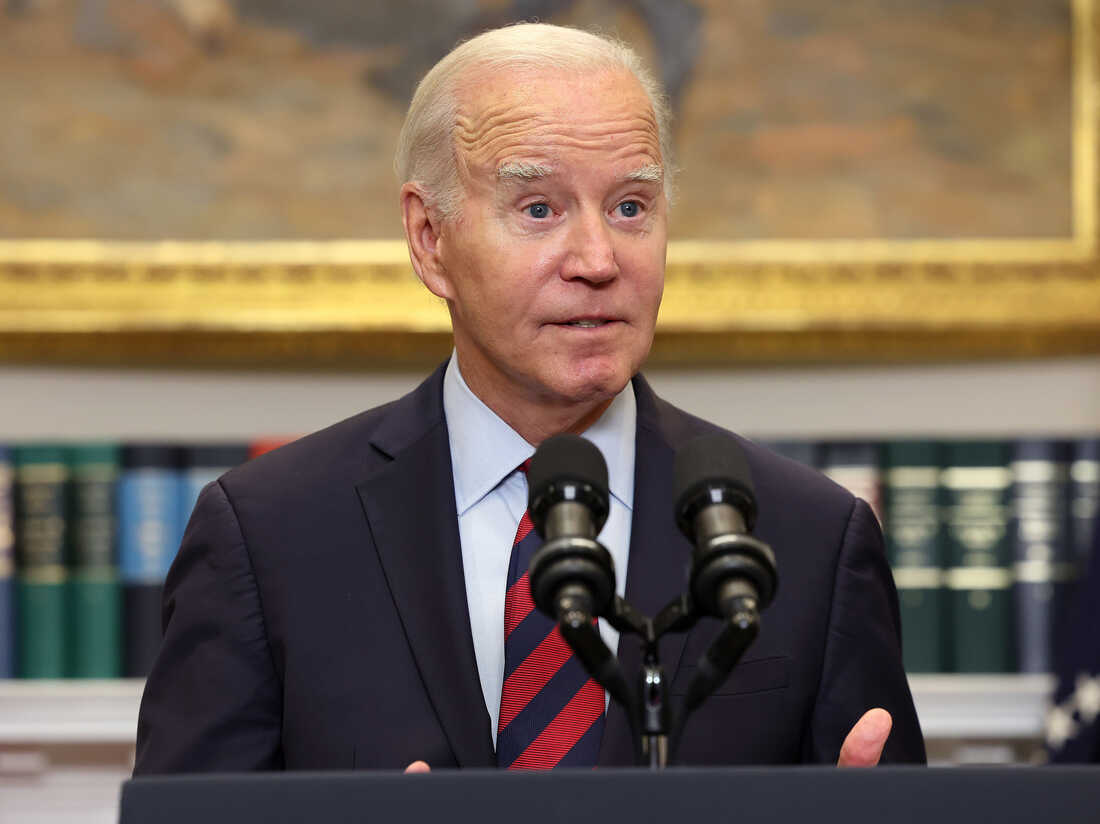Biden says he's worried about Ukraine aid. The Pentagon warns it's running low
By Tamara Keith|Tom Bowman|Greg Myre
President Biden told reporters on Wednesday that he's worried about the fate of his $24 billion request for Ukraine aid. Kevin Dietsch/Getty Images hide caption
toggle caption Kevin Dietsch/Getty ImagesPresident Biden told reporters on Wednesday that he's worried about the fate of his $24 billion request for Ukraine aid.
Kevin Dietsch/Getty ImagesPresident Biden said he is worried that disarray in Congress could undermine his promise to give Ukraine what it needs for its fight against Russia — concerns that come as the Pentagon warns that military aid in Ukraine is rapidly running out.
NPR has learned the Pentagon has warned U.S. lawmakers that they urgently need to approve more aid to prevent a disruption in the flow of weapons to Ukraine.
Biden had asked Congress for for fresh military, humanitarian and economic aid for Ukraine through the end of the calendar year. But the House of Representatives left that out of the recent stopgap measure that keeps government funded through Nov. 17.
"I'm going to make the argument that it's overwhelmingly in the interests of the United States of America that Ukraine succeed," Biden said. "I don't think we should let gamesmanship get in the way of blocking it."
Ukraine's supporters say ongoing funding is critical as Ukraine presses an offensive against Russian troops in the south and the east of the country. The operation has been moving more slowly, and at a higher cost in lives and equipment, than many predicted.
Army veteran Rep. Jason Crow, D-Colo., speaks at a May 23, 2023 event. Crow says U.S. spending on Ukraine is a "good bargain" because of the impact Ukraine has had on Russia's military. Chip Somodevilla/Getty Images hide caption
toggle caption Chip Somodevilla/Getty ImagesArmy veteran Rep. Jason Crow, D-Colo., speaks at a May 23, 2023 event. Crow says U.S. spending on Ukraine is a "good bargain" because of the impact Ukraine has had on Russia's military.
Chip Somodevilla/Getty ImagesThe United States provides the most military aid to Ukraine
The U.S. has provided the most military assistance to Ukraine, and supporters say it has made a huge difference in its strong performance against a larger Russian military.
"We have spent about 5% of our annual defense budget, and with that money, the Ukrainians have destroyed over 60% of the Russian military," said Rep. Jason Crow, D-Colo. "Now, if that's not a good bargain for the American taxpayer, I don't know what is."
Crow is a former Army Ranger who served in Iraq and Afghanistan. Asked if he thought Americans were weary of another open-ended conflict with a big price tag, he replied:
"Well, I can tell you I'm war-weary," he said. "You know, the last 20 years (of wars) could not be classified as a success by most measures. And yet, I'm a huge supporter of Ukraine."
One frequent criticism of more U.S. spending on Ukraine is that European nations should be doing more.
But a number of recent studies have tabulated that Europe, collectively, has provided more overall assistance than the United States. Also, Poland and other European countries have taken in millions of Ukrainian refugees and continue hosting them.
This European support has proven much larger, and more durable, than almost anyone predicted.
Ukrainian leaders openly acknowledge that one of their greatest fears is that Western aid will stop flowing. Ukrainians often say that they're not asking the West to send troops to fight, but they are asking for weapons so Ukrainians can fight the Russians.
Ukrainians say they understand they can't rely on foreign military aid indefinitely and will have to become more self-sufficient. Toward that end, Ukraine hosted a conference of Western arms makers last weekend and urged them to set up production facilities in Ukraine.
But for now, the Ukrainians remain dependent on Western aid, and all the signs are pointing toward a protracted conflict.



